
-
 Yesavage fairytale carries Blue Jays to World Series brink
Yesavage fairytale carries Blue Jays to World Series brink
-
Bank of Japan keeps interest rates unchanged

-
 Impoverished Filipinos forge a life among the tombstones
Impoverished Filipinos forge a life among the tombstones
-
Jokic posts fourth straight triple-double as Nuggets rout Pelicans

-
 UN calls for end to Sudan siege after mass hospital killings
UN calls for end to Sudan siege after mass hospital killings
-
Teenage Australian cricketer dies after being hit by ball

-
 As Russia advances on Kupiansk, Ukrainians fear second occupation
As Russia advances on Kupiansk, Ukrainians fear second occupation
-
Trade truce in balance as Trump meets 'tough negotiator' Xi

-
 China to send youngest astronaut, mice on space mission this week
China to send youngest astronaut, mice on space mission this week
-
Yesavage gem carries Blue Jays to brink of World Series as Dodgers downed

-
 With inflation under control, ECB to hold rates steady again
With inflation under control, ECB to hold rates steady again
-
Asia stocks muted with all eyes on Trump-Xi meeting

-
 Personal tipping points: Four people share their climate journeys
Personal tipping points: Four people share their climate journeys
-
Moto3 rider Dettwiler 'no longer critical' after crash: family

-
 US economy in the dark as government shutdown cuts off crucial data
US economy in the dark as government shutdown cuts off crucial data
-
Trump orders nuclear testing resumption ahead of Xi talks

-
 'Utter madness': NZ farmers agree dairy sale to French group
'Utter madness': NZ farmers agree dairy sale to French group
-
Samsung posts 32% profit rise on-year in third quarter

-
 30 years after cliffhanger vote, Quebec separatists voice hope for independence
30 years after cliffhanger vote, Quebec separatists voice hope for independence
-
Taxes, labor laws, pensions: what Milei wants to do next

-
 South Sudan's blind football team dreams of Paralympic glory
South Sudan's blind football team dreams of Paralympic glory
-
US says 4 killed in new strike on alleged Pacific drug boat
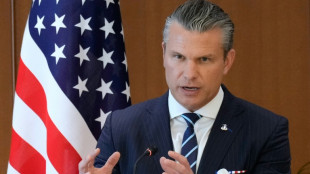
-
 What we do and don't know about Rio's deadly police raid
What we do and don't know about Rio's deadly police raid
-
'They slit my son's throat' says mother of teen killed in Rio police raid

-
 Arteta hails 'special' Dowman after 15-year-old makes historic Arsenal start
Arteta hails 'special' Dowman after 15-year-old makes historic Arsenal start
-
Google parent Alphabet posts first $100 bn quarter as AI fuels growth

-
 Underwater 'human habitat' aims to allow researchers to make weeklong dives
Underwater 'human habitat' aims to allow researchers to make weeklong dives
-
Maresca slams Delap for 'stupid' red card in Chelsea win at Wolves

-
 'Non-interventionist' Trump flexes muscles in Latin America
'Non-interventionist' Trump flexes muscles in Latin America
-
Slot defends League Cup selection despite not meeting 'Liverpool standards'

-
 'Poor' PSG retain Ligue 1 lead despite stalemate and Doue injury
'Poor' PSG retain Ligue 1 lead despite stalemate and Doue injury
-
Liverpool crisis mounts after League Cup exit against Palace

-
 Kane scores twice as Bayern set European wins record
Kane scores twice as Bayern set European wins record
-
Radio Free Asia suspends operations after Trump cuts and shutdown

-
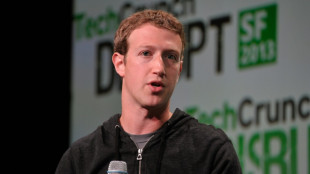 Meta shares sink as $16 bn US tax charge tanks profit
Meta shares sink as $16 bn US tax charge tanks profit
-
Dollar rises after Fed chair says December rate cut not a given
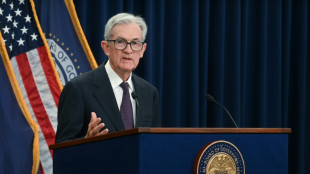
-
 Google parent Alphabet posts first $100 bn quarter as AI drives growth
Google parent Alphabet posts first $100 bn quarter as AI drives growth
-
Rob Jetten: ex-athlete setting the pace in Dutch politics
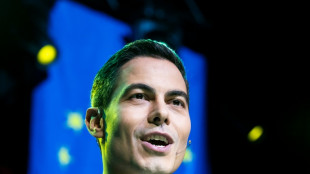
-
 Juve bounce back after Tudor sacking as Roma keep pace with leaders Napoli
Juve bounce back after Tudor sacking as Roma keep pace with leaders Napoli
-
Favorite Sovereignty scratched from Breeders' Cup Classic after fever

-
 Doue injured as PSG held at Lorient in Ligue 1
Doue injured as PSG held at Lorient in Ligue 1
-
Leverkusen win late in German Cup, Stuttgart progress

-
 Jihadist fuel blockade makes life a struggle in Mali's capital
Jihadist fuel blockade makes life a struggle in Mali's capital
-
Uber plans San Francisco robotaxis in Waymo challenge

-
 Paramilitary chief vows united Sudan as his forces are accused of mass killings
Paramilitary chief vows united Sudan as his forces are accused of mass killings
-
Trump, Xi to meet seeking truce in damaging trade war

-
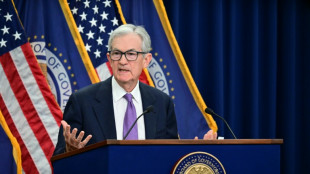 Divided US Fed backs second quarter-point rate cut of 2025
Divided US Fed backs second quarter-point rate cut of 2025
-
'Amazing' feeling for Rees-Zammit on Wales return after NFL adventure

-
 'Cruel' police raids help, not hinder, Rio's criminal gangs: expert
'Cruel' police raids help, not hinder, Rio's criminal gangs: expert
-
S. African president eyes better US tariff deal 'soon'


US researchers seek to legitimize AI mental health care
Researchers at Dartmouth College believe artificial intelligence can deliver reliable psychotherapy, distinguishing their work from the unproven and sometimes dubious mental health apps flooding today's market.
Their application, Therabot, addresses the critical shortage of mental health professionals.
According to Nick Jacobson, an assistant professor of data science and psychiatry at Dartmouth, even multiplying the current number of therapists tenfold would leave too few to meet demand.
"We need something different to meet this large need," Jacobson told AFP.
The Dartmouth team recently published a clinical study demonstrating Therabot's effectiveness in helping people with anxiety, depression and eating disorders.
A new trial is planned to compare Therabot's results with conventional therapies.
The medical establishment appears receptive to such innovation.
Vaile Wright, senior director of health care innovation at the American Psychological Association (APA), described "a future where you will have an AI-generated chatbot rooted in science that is co-created by experts and developed for the purpose of addressing mental health."
Wright noted these applications "have a lot of promise, particularly if they are done responsibly and ethically," though she expressed concerns about potential harm to younger users.
Jacobson's team has so far dedicated close to six years to developing Therabot, with safety and effectiveness as primary goals.
Michael Heinz, psychiatrist and project co-leader, believes rushing for profit would compromise safety.
The Dartmouth team is prioritizing understanding how their digital therapist works and establishing trust.
They are also contemplating the creation of a nonprofit entity linked to Therabot to make digital therapy accessible to those who cannot afford conventional in-person help.
- Care or cash? -
With the cautious approach of its developers, Therabot could potentially be a standout in a marketplace of untested apps that claim to address loneliness, sadness and other issues.
According to Wright, many apps appear designed more to capture attention and generate revenue than improve mental health.
Such models keep people engaged by telling them what they want to hear, but young users often lack the savvy to realize they are being manipulated.
Darlene King, chair of the American Psychiatric Association's committee on mental health technology, acknowledged AI's potential for addressing mental health challenges but emphasizes the need for more information before determining true benefits and risks.
"There are still a lot of questions," King noted.
To minimize unexpected outcomes, the Therabot team went beyond mining therapy transcripts and training videos to fuel its AI app by manually creating simulated patient-caregiver conversations.
While the US Food and Drug Administration theoretically is responsible for regulating online mental health treatment, it does not certify medical devices or AI apps.
Instead, "the FDA may authorize their marketing after reviewing the appropriate pre-market submission," according to an agency spokesperson.
The FDA acknowledged that "digital mental health therapies have the potential to improve patient access to behavioral therapies."
- Therapist always in -
Herbert Bay, CEO of Earkick, defends his startup's AI therapist Panda as "super safe."
Bay says Earkick is conducting a clinical study of its digital therapist, which detects emotional crisis signs or suicidal ideation and sends help alerts.
"What happened with Character.AI couldn't happen with us," said Bay, referring to a Florida case in which a mother claims a chatbot relationship contributed to her 14-year-old son's death by suicide.
AI, for now, is suited more for day-to-day mental health support than life-shaking breakdowns, according to Bay.
"Calling your therapist at two in the morning is just not possible," but a therapy chatbot remains always available, Bay noted.
One user named Darren, who declined to provide his last name, found ChatGPT helpful in managing his traumatic stress disorder, despite the OpenAI assistant not being designed specifically for mental health.
"I feel like it's working for me," he said.
"I would recommend it to people who suffer from anxiety and are in distress."
J.Marty--VB




